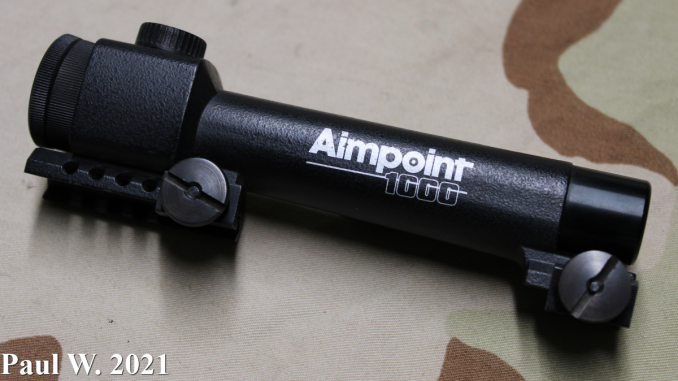
While Aimpoint enjoyed success with the Electronic series of optics, they still pushed their designs forward. The next evolution of the Aimpoint was incremental, with the release of the Aimpoint 1000 in 1987. While being a slight change in design, is the 1000 the missing red dot link?
What is the Aimpoint 1000?
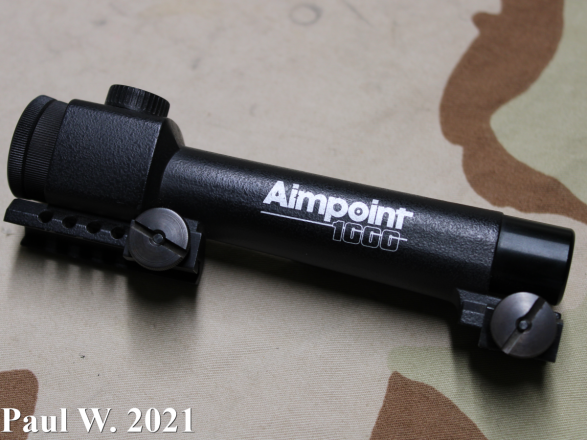
The Aimpoint 1000 is an LED-emitter red dot optic, released by the Swedish based company, Aimpoint. The 1000 entered production in 1987, and was produced until 1991. While not a necessary read, my prior article about the Electronic would be a helpful primer for this article, as the 1000 and the Electronic Mark III share many features. Just what features does the 1000 offer?
Features of the Aimpoint 1000
The Aimpoint 1000 is fundamentally an improved Mark III. It has a smaller profile, uses more readily available batteries, and has better battery life. It’s a step forward, but not a massive one.
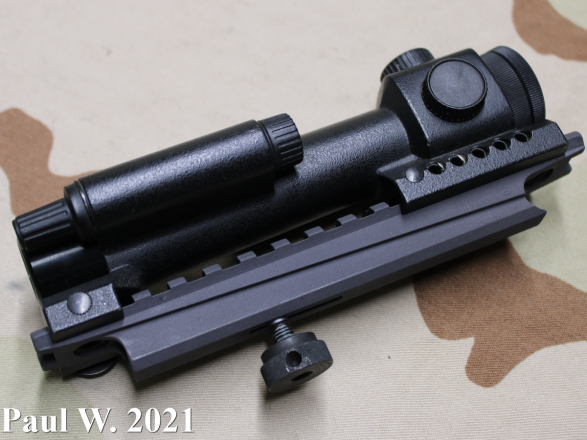
Mounting via a familiar adjustable Weaver clamp system, the 1000 can fit onto 1913 with a little persuasion. Just like the Electronic, the 1000 has the battery compartment alongside the optic.
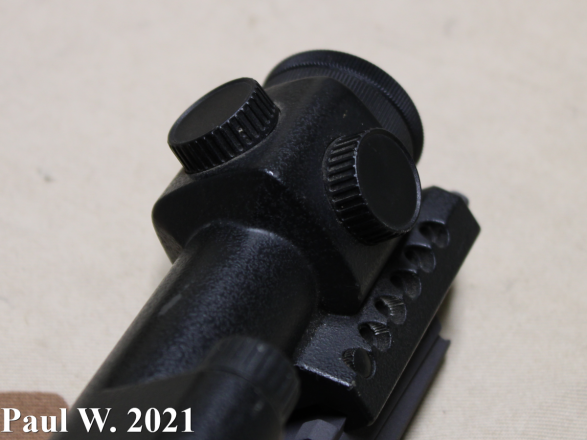
The windage and elevation turrets are covered by plastic caps, and are easy to zero. Much like the Mark III, the adjustments are at the front of the optic.

Both the front and rear of the optic tube are threaded, allowing for mounting additional pieces. I keep a rotating notch filter at the front, which allows me to modify my tint on the optic, making it easier to see the dot on very bright days. However, you can add some goofy stuff to the back too.

Yes, you can thread a 3 power scope onto the 1000. The Electronics could also do this too, and the scope is as crappy as you’d expect for a piece of 40 year old magnified glass. With the notch filter on, the optic is almost impossible to use with the scope, but it is more feasible when you remove it. The 3X Aimpoint Scope is a fun novelty, but it sucks.
The objective window of the 1000 is the same as the prior Electronics. It is a thin 14mm tube, but is still plenty usable. While it looks muddied in the above photos, that is just how the notch filter and the camera’s focus interact. The dot is not visible in the photos, but you can see the emitter glowing red in the image from the front of the optic. It is relatively crisp and clean, and makes shooting a breeze.
Battery selection is much simpler to get for the 1000, as it still uses modern batteries. Aimpoint recommends a single CR1/3N or DL1/3N battery, the same as later COMP series optics. Two LR44 batteries can also be used. Battery life tends to run about 100 hours, which is a big improvement of the 50 hour life of the Electronics.
Legacy of the Aimpoint 1000
The Aimpoint 1000 was the last of the thin-tubed, built-in mount Aimpoints. Later optics, such as the 2000 and 3000, used traditional scope rings to mount to firearms, and had very different designs. While the 1000 can be seen as the best iteration of the Electronic, it was the last of the “old” style of Aimpoint. However, it was the bridge from the old generation to the next step forward. The good features of the optic were retained going forward, with the vestigial ones being left behind. Darwin would be proud.
My Recommendation On the Aimpoint 1000
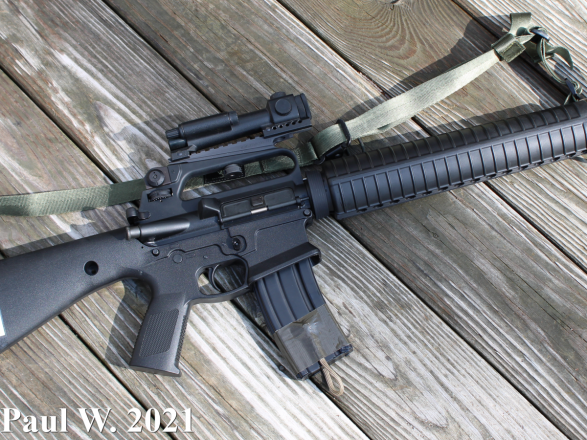
The 1000 is what I would consider to be the first “worthwhile” retro Aimpoint for someone to buy. While I really enjoy the Electronics, the 1000 is much easier to actually use. The batteries and battery life are superior to the prior optics, and mounting it is generally easier. The optic is lighter and more svelte, and should stand up to more wear.
Should you buy a 1000? Sure, if you want a cool old optic, and don’t mind spending the money for it. The prices on these continue to rise as time progresses, and they aren’t getting any younger!
An Update On the History of the Aimpoint 1000
Recently, we received a comment from DB Holly. DB was a company armorer for 160th SOAR during Operation Prime Chance in 1988, and he had taken photos of Aimpoint 1000s mounted to M134 miniguns on AH-6 Blackhawk helicopters. I reached out to DB, and he sent me the following photos.
DB stated that the 1000s were mounted on optic rails on the miniguns, and then zip-tied to make sure that they wouldn’t come loose. He also stated that the optics were not very useful on the miniguns, so gunners would generally just aim by guiding their tracers onto target. I had no knowledge about Operation Prime Chance, let alone knowledge of early Aimpoints on miniguns. These images are incredibly cool to see. Massive thanks DB Holly for sending them in!
Links to Other Aimpoint History Articles





Aimpoint 1000 on / off switch broke.Can you help with replacement Part?
thank you
Nils
845 742 6273
Nice article, Former Nightstalker here, the Aimpoint 1000 was the first red dot carried into combat by the Army, during Operation Prime Chance. The 160th SOAG(A) Blackhawk Mini guns were mounted with Aimpoint1000s.Email me for a pic from my personal collection.